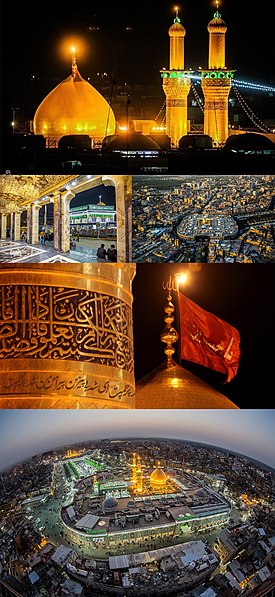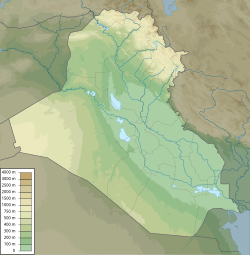
Back كربلاء Arabic كربلاء ARZ Kərbəla Azerbaijani کربلا AZB Кәрбәлә Bashkir Кербела Byelorussian Кербала Bulgarian কারবালা Bengali/Bangla Karbala Breton Karbala Catalan
Karbala
كَرْبَلَاء | |
|---|---|
| Mayoralty of Karbala | |
 | |
 | |
| Coordinates: 32°37′N 44°02′E / 32.617°N 44.033°E | |
| Country | |
| Governorate | Karbala |
| Settled | 690 CE |
| Government | |
| • Type | Mayor–council |
| Area | |
• Total | 42.4 km2 (16.4 sq mi) |
| Elevation | 28 m (92 ft) |
| Population | |
• Estimate (2018)[1] | 711,530 |
| Demonym | Karbalaei |
| Time zone | UTC+3 (Arabian Standard Time) |
| • Summer (DST) | UTC+3 (No DST) |
| Postal code | 10001 to 10090 |
| Part of a series on Shia Islam |
|---|
 |
|
|
Karbala[a] is a city in central Iraq, located about 100 km (62 mi) southwest of Baghdad, and a few miles east of Lake Milh, also known as Razzaza Lake.[6][7] Karbala is the capital of Karbala Governorate, and has an estimated population of 691,100 people (2024).[8]
The city, best known as the location of the Battle of Karbala in 680 AD, or for the shrines of Hussain and Abbas,[9][10] is considered a holy city for Shia muslims. Tens of millions of Shi'ite Muslims visit the site twice a year. [11][12][13][14] The martyrdom of Husayn ibn 'Ali and Abbas ibn 'Ali is commemorated annually by near a hundred million of Shi'ites in the city.[11][12][13][15]
Up to 34 million pilgrims visit the city to observe ʿĀshūrāʾ (the tenth day of Muharram), which marks the anniversary of Husayn's death, but the main event is the Arbaʿeen (the 40th day after 'Ashura'), where up to 40 million visit the graves. Most of the pilgrims travel on foot and come from all around Iraq and more than 56 countries.[16]
- ^ "Iraq: Governorates & Cities".
- ^ "Karbala". Collins English Dictionary. HarperCollins. Retrieved 30 July 2019.
- ^ "Karbala". Lexico UK English Dictionary. Oxford University Press. Archived from the original on 2020-03-22.
- ^ "Karbala". The American Heritage Dictionary of the English Language (5th ed.). HarperCollins. Retrieved 30 July 2019.
- ^ "Karbalā'". Merriam-Webster.com Dictionary. Merriam-Webster. Retrieved 30 July 2019.
- ^ "Iraq: Livelihoods at risk as level of Lake Razaza falls". IRIN News. 5 March 2008. Retrieved 25 November 2015.
- ^ Under Fire: Untold Stories from the Front Line of the Iraq War. Reuters Prentice Hall. January 2004. p. 15. ISBN 978-0-13-142397-8.
- ^ "Karbala, Iraq Metro Area Population 1950-2024". www.macrotrends.net. Retrieved 2024-06-18.
- ^ Shimoni & Levine, 1974, p. 160.
- ^ Aghaie, 2004, pp. 10–11.
- ^ a b Malise Ruthven (2006). Islam in the World. Oxford University Press. p. 180. ISBN 9780195305036.
- ^ a b David Seddon (11 Jan 2013). Political and Economic Dictionary of the Middle East. Karbala (Kerbala): Routledge. ISBN 9781135355616.
- ^ a b John Azumah; Dr. Kwame Bediako (Foreword) (26 May 2009). My Neighbour's Faith: Islam Explained for African Christians. Main Divisions and Movements Within Islam: Zondervan. ISBN 9780310574620.
- ^ Paul Grieve (2006). A Brief Guide to Islam: History, Faith and Politics: The Complete Introduction. Carroll and Graf Publishers. p. 212. ISBN 9780786718047.
- ^ Paul Grieve (2006). A Brief Guide to Islam: History, Faith and Politics : the Complete Introduction. Carroll and Graf Publishers. p. 212. ISBN 9780786718047.
- ^ "Interactive Maps: Sunni & Shia: The Worlds of Islam". PBS. Retrieved June 9, 2017.
Cite error: There are <ref group=lower-alpha> tags or {{efn}} templates on this page, but the references will not show without a {{reflist|group=lower-alpha}} template or {{notelist}} template (see the help page).

